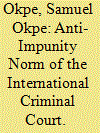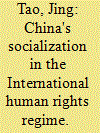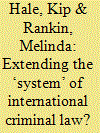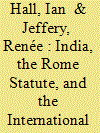|
|
|
Sort Order |
|
|
|
Items / Page
|
|
|
|
|
|
|
| Srl | Item |
| 1 |
ID:
175109


|
|
|
|
|
| Summary/Abstract |
In recent years, the position of the International Criminal Court (ICC) in Africa has become an issue of contention. Through the African Union (AU), African leaders have expressed their concern in relation to the principle of impunity and self-sovereignty of African nations. The AU asserts fiercely that the influence of the ICC is overwhelming on the African continent; therefore, African leaders clamor for an amendment to the court or even a total withdrawal. I argue that the change of relationship initiated by the AU is not only selfish but also unequivocally harmful to the tenets of justice, law and order. By way of a vast exploration of data (internet sources, official government records, print sources and online interviews), this study reiterates the importance of the anti-impunity norm of the ICC as an instrument of equity, especially when African leaders are involved.
|
|
|
|
|
|
|
|
|
|
|
|
|
|
|
|
| 2 |
ID:
141456


|
|
|
|
|
| Summary/Abstract |
This article uses a hard law—the Rome Statute of the International Criminal Court—to examine the depth of China's socialization in the international human rights regime and the relative weights of sovereignty and human rights norms in determining China's policy choices. It shows that the reasons for China's rejection of the Rome Statute are twofold. On the one hand, Chinese leaders have not fully internalized human rights norms, and they prioritize state sovereignty over human rights when making decisions. On the other hand, the legalized Rome Statute sets up an independent court with mandatory jurisdiction and grants the Prosecutor the ex officio right to investigate a crime. Such treaty provisions may have negative impacts on China's core sovereignty of territorial integration and regime security, thus imposing high sovereignty costs on China. Therefore, China resolutely voted against the Rome Statute, even if such an action made it a small minority outside the international mainstream. These findings indicate that China is still in a weak socialization stage and is not able to take on binding human rights and humanitarian obligations with high sovereignty costs.
|
|
|
|
|
|
|
|
|
|
|
|
|
|
|
|
| 3 |
ID:
120610


|
|
|
|
|
| Publication |
2013.
|
| Summary/Abstract |
This article investigates whether it is possible and recommendable that corporate criminal responsibility should be introduced for international crimes and that the International Criminal Court should therefore have jurisdiction over legal entities. This article adopts the French proposal on corporate criminal liability, presented during the drafting process of the Rome Statute, as preliminary normative framework, and links this framework with case law of both domestic and international criminal courts in which individual business leaders stood trial on charges of complicity in international crimes. The recurrent question is whether it would have been fair and feasible in those situations to hold the legal entity which these corporate agents were representing criminally responsible as well. The analysis reveals that the answer to this question would undoubtedly have been affirmative. The author argues that the cases which have been investigated represent particularly strong instances of corporate involvement in international crimes. The knowledge and contributions of corporate agents which are required to incur criminal responsibility for complicity in international crimes correspond and correlate with their position of power and control within the corporation, which is necessary to implicate the legal entity.
|
|
|
|
|
|
|
|
|
|
|
|
|
|
|
|
| 4 |
ID:
170261


|
|
|
|
|
| Summary/Abstract |
Despite its short life of 16 years, the International Criminal Court (‘ICC’ or ‘Court’) is no stranger to controversy. Indeed, contestation started before the ICC began operations. Throughout the drafting the Rome Statue, the ICC's founding treaty, states such as Germany argued vehemently for the ICC to be granted universal jurisdiction, while the permanent five members of the United Nations Security Council (‘UNSC’ or ‘Council’) remained reticent to relinquish full jurisdiction over the core international crimes (Eikel 2018), including war crimes, crimes against humanity, and genocide (collectively ‘atrocity crimes’). Even after the Rome Statute was passed and the ICC was founded, albeit without universal jurisdiction, it remained embattled. Not only was it criticised for its ineptness at the early stages of its establishment, the Court continued to be condemned for its lack of involvement in global hotspots outside its jurisdiction. For instance, despite being described as the worst humanitarian disaster since the Second World War (Al Hussein 2017), the ICC does not have jurisdiction over alleged atrocity crimes in Syria – namely, because Syria is not a State Party to the Rome Statute, but also because Russia and China as permanent members of the UNSC have blocked attempts to refer it to the ICC.
|
|
|
|
|
|
|
|
|
|
|
|
|
|
|
|
| 5 |
ID:
184662


|
|
|
|
|
| Summary/Abstract |
Despite its long-standing rhetorical support for an international criminal justice regime, India continues to resist signing the 1998 Rome Statute that created the International Criminal Court. This article explores the reasons for this reluctance. It observes that during the negotiations that led to the Rome Statute, India voiced multiple objections to the design of the ICC, to how it was to function, and to the crimes that it was to address. It argues that analyzing the negotiating strategy India employed during those talks allows us to discern which reasons mattered more to New Delhi and what accounts for India’s ongoing refusal to sign the Rome Statute.
|
|
|
|
|
|
|
|
|
|
|
|
|
|
|
|
| 6 |
ID:
108251


|
|
|
|
|
| Publication |
2011.
|
| Summary/Abstract |
This article explores the possibility of locating an 'ethics of memory' respecting commission of mass atrocities via the link between justice, truth and memory. First, it suggests a typology for memory in relation to justice in its retributive and restorative aspects. Second, it explores how so-called 'memory-justice' arises in the course of international proceedings-and particularly given its significance under the Rome Statute-by considering, critically, the international community's ability to repair or restitute injury by engaging in memory in 'the right way'. Lastly, it suggests limitations of memory-justice of which only some can be overcome. The challenges and arguments for a 'categorical imperative' for memory are left for a subsequent treatment, but arguments in law and practical ethics will be suggested in favour of properly approaching memory in pursuit of justice, with profound consequences for the nascent Court and sister tribunals, in their efforts to break the cycle of conflict in affected regions, and rid the world of the worst crimes known to humanity.
|
|
|
|
|
|
|
|
|
|
|
|
|
|
|
|
| 7 |
ID:
130970


|
|
|
|
|
| Publication |
2014.
|
| Summary/Abstract |
Many conflicts in the Asia-Pacific region have included sexual violence crimes targeted primarily against women. However, in comparison to other regions, Asia-Pacific states have been reluctant to embrace international law innovations to end impunity for such crimes into the future, as evidenced by their unwillingness to become signatories to the Rome Statute of the International Criminal Court. Of the 39 countries constituting the Asia-Pacific region, only 17-less than half-have joined the Rome Statute. This article initially surveys some of the reasons for non-ratification of the Statute. It further examines the role of civil society and the potential normative impact of the Statute to enhance national sexual violence legislation and prosecutions. Finally, it identifies some practical steps that the Australian government could take to encourage regional states to ratify, implement and enforce the Rome Statute in order to further protect all victims of international crimes and bolster the broader Women, Peace and Security framework.
|
|
|
|
|
|
|
|
|
|
|
|
|
|
|
|
|
|
|
|
|